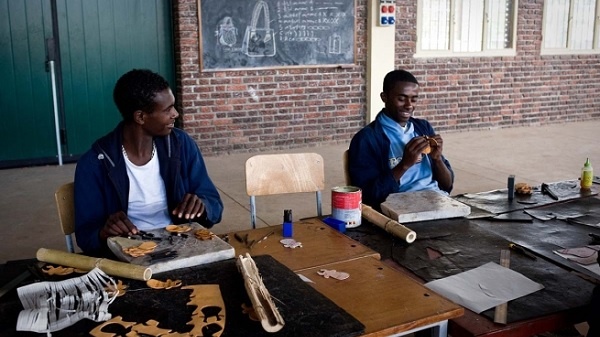
ADDIS ABABA (Mission Newswire) – Salesian missionaries in Mekanisa, an area on the outskirts of the capital city of Addis Ababa, Ethiopia, operate the Don Bosco Center, which provides access to education, nutrition and health services to 400 poor youth. Most of the youth, aged 2-15 are street children who have no place else to live or anyone to take care of them. Brother Donato Galetta, a Salesian missionary, has been welcoming these youth for 30 years.
All 400 children enjoy daily lunch and close to 40 children, mainly orphans, also have dinner at the center. Salesian missionaries are actively working to fight malnutrition and undernourishment. For the past two years in order to guarantee everyone a meal, Salesian missionaries have not purchased meat, which in Ethiopia has prohibitive costs. This allows missionaries to buy the food they require for their annual needs while keeping costs down.
The Don Bosco Center in Mekanisa also offers a small medical dispensary, which is managed by a nurse. Youth receive first aid, routine health check-ups and medicine when needed. Youth are able to take a hot shower, and hygiene and sanitary supplies are available.
Youth also have assistance with their education at the Don Bosco Center, including a school uniform and school materials such as textbooks, notebooks, pens and pencils. For older children who attend vocational training courses, Salesian missionaries provide transportation to school. In addition, Salesian missionaries pay the school fees of all the center’s children and older youth.
“In Addis Ababa and the outskirts in Mekanisa, there are as many as 100,000 children who desperately need assistance getting off the streets and turning their lives around,” explains Father Mark Hyde, director of Salesian Missions, the U.S. development arm of the Salesians of Don Bosco. “At the Don Bosco Center, youth who live in the most extreme poverty have access to nutrition, health services, and the funding and supplies needed to gain an education. Youth are given a second chance in life and hope for the future.”
Ethiopia is one of the poorest countries in the world with more than 38 percent of its population living in poverty, according to Feed the Future. Close to 85 percent of the country’s workforce is employed in agriculture but frequent droughts severely affect the agricultural economy leaving more than 12 million people chronically, or at least periodically, food insecure. In addition, more than two-thirds of the population is illiterate.
The country has 4 million orphans which account for nearly 12 percent of all children and according to UNICEF, more than half a million of these were orphaned as a result of the HIV/AIDS crisis that has affected the country. Thousands more children run away each year seeking a better life on the streets.
Source: MissionNewswire
